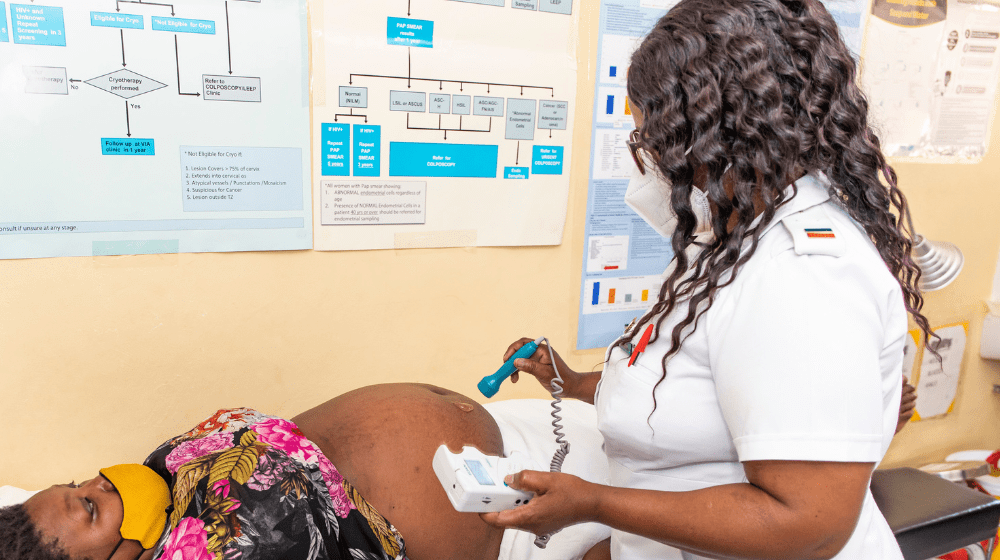GABORONE, Botswana – Amogelang Monnatlhare, a nurse-midwife with the Botswana Family Welfare Association, recalls the first time she assisted a lady in giving birth. She was on her knees, sweating profusely, in a little mud hut in the village of Qabo, hours away from the nearest hospital. The mother was delivering at home. Amogelang was not a midwife at the time. The mom and her child both survived. This was the turning point in her life that solidified her interest in midwifery.
Amogelang has been a midwife for fifteen years and has assisted in the delivery of hundreds of babies. Her face lights up when she talks about her time as a midwife. "I feel honored every time I assist a woman in giving birth.". “I, personally, believe that midwifery is my calling,” she added.
I, personally, believe that midwifery is my calling
Every moment of child delivery is wonderful and distinct to her. Of course, there are difficult times in her line of work. She narrates of such an experience: "There was a time when I was alone on duty on a weekend and a pregnant woman came in to the facility," she recalls. She had registered at another health facility but decided to give birth at ours. After observing her, I chose to refer her to the nearest hospital because I noticed the baby was in an improper position and I had never delivered a breech baby before.
When we were on our way to the hospital from the clinic, the woman began pushing, so I told the driver to take us to the doctor's house. Upon arrival at the doctor’s house, the baby came out while still in the ambulance. Instead of the head, the legs came first. The doctor panicked. The woman screamed in agony, and I leapt into action as I remembered a method we'd learned in a training and requested the doctor to try it. I asked him to put his hand inside and use his fingers to help with the birth. The baby eventually came out after what seemed like a lifetime. But it was not over yet, we had to rush to the clinic to save the baby's life. We also found that the woman had a retained placenta and was bleeding excessively, so we referred her to a hospital where she could receive better care. After a few days, both mother and baby recovered well."
According to Amogelang, this incident taught her that midwives are extremely important in childbirth because most doctors rely on them. She takes satisfaction in the fact that she has never recorded any maternal deaths in her 15-year tenure.
"Imagine a mother losing her baby at the last minute after carrying them for nine months. It is our obligation to prevent this from happening," she stated.
The role of midwives beyond childbirth
A midwife's job extends far beyond childbirth to include care before and after the delivery, family planning, counseling, STI prevention and treatment, including for adolescents, and support for survivors of gender-based violence. They are linked to more good birthing experiences and family planning. Most importantly, if the global demand for midwives were met, the rate of maternal deaths, stillbirths, and newborn deaths would be reduced by 83%. Midwives save lives in a world where 830 women die every day from pregnancy and childbirth complications.
Invest in midwives; save lives
Midwives deserve greater investment in their capacities, as well as environments that empower and fully recognize their skills and contributions. UNFPA calls for policymakers, leaders, partners, and advocates to invest in the maternal health workforce—and, by extension, mothers—by providing the necessary resources, support, and supplies needed to ensure quality care remains available.
Midwifery has been proved to reduce maternal mortality, to be cost-effective, and to offer much-needed care to women. Such achievements depend on midwives receiving better education and training, as well as comprehensive and supportive workplace regulation. They must have a greater role in professional leadership and governance as well as the opportunity to apply their unique knowledge to drive advancements in health policies and service delivery.
Ms. Tlangelani Shilubane, UNFPA Botswana Head of Office, adds that, despite a favorable policy climate to improve universal access to sexual and reproductive health needs, some key indicators, such as maternal mortality, remain off track to meet the 2030 targets. Midwives play an important role as national stakeholders in assisting the government to improve the quality and reach of family planning and maternal health services in order to save lives.
Health systems everywhere need to take note—and take action—because investing in empowered midwives is one of the surest ways to safeguard life and protect the health and well-being of all.
Honoring Midwives on May 5
On May 5, the International Day of the Midwife recognizes the life-saving efforts of midwives all across the world. "Every woman has the right to lifesaving healthcare." Midwives are important to making this happen. "On this International Day of Midwives, let us fully recognize midwives' skills and contributions and invest in them to safeguard life and protect the health and wellbeing of women, newborns, and communities at large," says Dr. Natalia Kanem in her statement.


